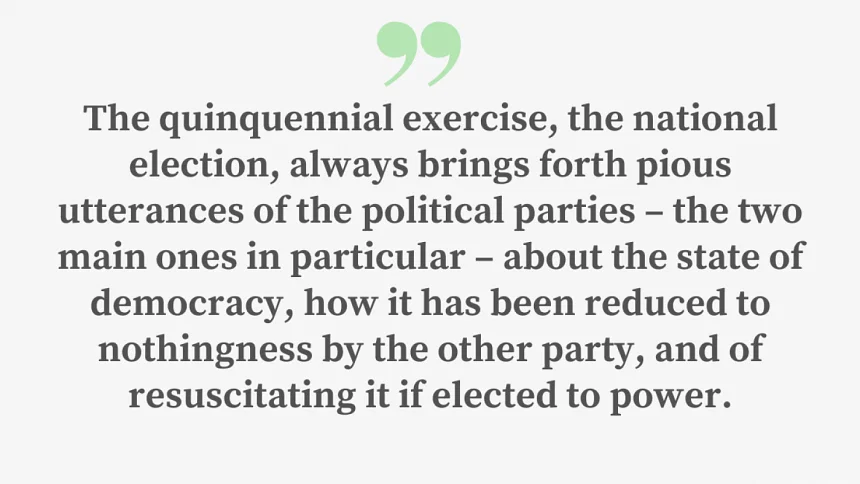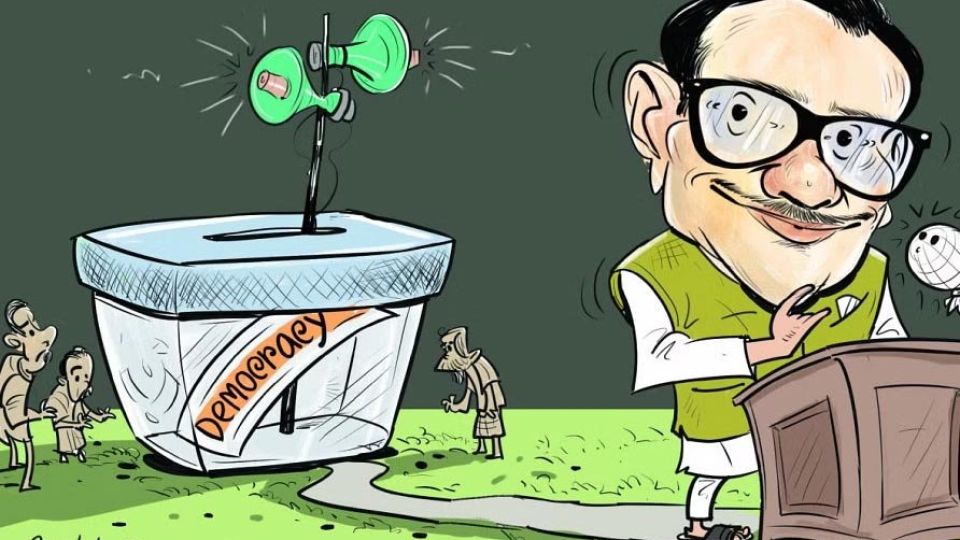February 9, 2023
DHAKA – Obaidul Quader is an oft-quoted person – and for good reasons. I, too, shall quote him at the start of this column. Following the very recent by-elections to the parliament seats vacated by BNP members, he is reported to have said, “Democracy has won.” And he is certain to flaunt the World Democracy Report that shows Bangladesh improving by two ranks. However, there is little to take comfort in the report since, in reality, our acquired marks remain the same; it’s only that two countries have done worse than us.
The minister has cited the “peaceful atmosphere” that prevailed during the polling on February 1. Indeed, it was very peaceful. When fewer than 20 percent of voters turn up to vote, it is bound to be peaceful. When the opposition voters are told not to bother to come to the polling stations, it is bound to be “peaceful.” When an opposition candidate goes into hiding, unable to withstand the pressure on him, peace is bound to follow. The recent by-polls represent the state of democracy in our country fairly accurately. The near-empty polling booths, if nothing, displays a lack of trust; in fact, it demonstrates people’s apathy towards elections and voting. Most voters feel it is an exercise in futility under the present circumstances, the results a forgone conclusion.
This was the picture in 2014 and 2018 as well. “People couldn’t cast their votes in that (December 30, 2018) election… They couldn’t vote in the union parishad and upazila parishad polls.” These are not my words but that of a leading member of the ruling party’s coalition – the president of the Workers’ Party. It is a sign of democratic regression set in motion a decade ago, and in this regard, the prognosis of Levitsky and Ziblatt, who in their both educative and frightening book Why Democracies Die, say, “Democratic backsliding today begins at the ballot box.”
Thus, the quinquennial exercise, the national election, always brings forth pious utterances of the political parties – the two main ones in particular – about the state of democracy, how it has been reduced to nothingness by the other party, and of resuscitating it if elected to power. And the most voluble is the ruling party, who goes into overdrive trying to nullify the oppositions’ criticism of its alleged disservice to political and economic egalitarianism. The ruling party has the added advantage, in addition to the public platform, of hogging the time and space of the parliament where, unlike a normal functioning legislature, it goes unchallenged in the absence of an opposition, unanswerable for its plans, policies, actions and deeds. It needs reminding ourselves that the current character of the parliament is unique in that the official parliamentary opposition is also represented in the cabinet.

It is no wonder, therefore, that democracy has come under criticism at home and is being subjected to scrutiny by our friends outside, for which the ruling party has taken umbrage. In this regard, very few can take issue with the Awami League when it decries outsiders’ attempt to serve us homilies on democracy or elections. No self-respecting citizen can accept that and should vehemently oppose such attempts.
But in this regard, the Awami League has selective memory when it comes to the party’s role as the opposition and its willing acceptance of foreign mediation, and at times direct intervention, in the events leading up to the general elections. It is convenient not to remember those actions since it avoids embarrassments. But we need to be reminded from time to time what the stances of the major political parties have been on various national and political issues in the past. For example, in 1994, the Awami League had no qualms in accepting mediation by the then Commonwealth Secretary-General Emeka Anyaoku, and accepted his representative Sir Ninian Stephen to sit between it and the BNP at the negotiating table. While the Awami League may not like to remember the role India played in 2014, history has not failed to record it. Were it not for the turncoats in Jatiya Party, who rebelled against Ershad or were compelled by circumstances to do so and participate in the 2014 election, things might have been different.
While one may not like to hear our development partners say that they would be watching the next elections very carefully, we have to lump it because we have afforded them the opportunity to comment on the state of our democracy. Hopes of a new dawn following our liberation was belied, first with the introduction of, though very short-lived, one-party rule, and then by changes brought about by the tragic events of August 15, 1975. Events of 1991 brought new hopes only to be dashed. If we were to concede Obaidul Quader’s accusation that it was the BNP who destroyed democracy in the country, may we ask what the Awami League has done to put it right in the decade and a half that the party has been in power?
Sometimes, Quader reveals the real state of politics in the country. He is reported to have said recently at a public meeting, “We have not been able to make politics interesting… no good people want to join politics now. No educated, honest person wants to do politics. But they should. Otherwise, politics will lack character” (Dhaka Tribune, January 8, 2023). We wonder whether the minister has ever given a thought as to why it is that the good and the educated don’t join politics. Politics does not only lack character, it lacks substance too. What we have today is a hybrid democracy where people have become irrelevant and clinging to power has become the be-all and end-all of politics.
The four indicators that Levitsky and Ziblatt warn us to look out for when democracy is in regression are “rejection of (or weak commitment to) the democratic rules of the game, denial of the legitimacy of political opponent, toleration or encouragement of violence. Readiness to curtail the civil liberties of opponents, including the media.” For the observant political observers, these should ring a bell.
Brig Gen Shahedul Anam Khan, ndc, psc (retd) is a former associate editor of The Daily Star.


